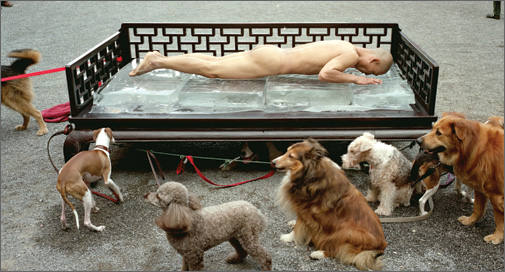|
By Alexa Olesen
New York Times, Art/Architecture, Nov.11, 2001

Zhang Huan’s "Pilgrimage--Wind and Water in New York," at P.S.1 in 1998.
The show made Mr. Zhang a star to some.
Making Art of Masochism and Tests of Endurance
Zhang Huan began his career in art by sitting still. A performance artist with a provocative edge, Mr. Zhang has managed, from humble beginnings in protest China, to make himself an international contemporary art success by enduring punishments of his own devising.
In May 1994, he created a "body experiment," "12 Square Meters," He sat for an hour, his body smeared with honey and fish oil, in an outhouse in Beijing. Hungry flies covered his body, crawling into his nose and ears, feasting.
The next month, he did another experiment, "65 Kilograms." He hung naked, suspended with chains, from the ceiling beams of his art studio. A bag of his drawn blood dripped onto a heated pan below, filling the room with its stench.
These pieces cemented Mr. Zhang’s reputation as the savviest self-promoter among a new crop of Chinese artists who emerged in the early 1990’s and excelled in art with shock value: violent, sexy, dirty and political. Mr. Zhang has continued to stand out.
This fall, at the Luhring Augustine gallery in Chelsea, a documentary photo series of his performance piece "Family Tree" carries a $90,000 price tag. Photographs of his work are also being featured through Nov. 18 at the Power Plant Contemporary Art Gallery in Toronto and through Feb. 17 at the Queens Museum of Art as part of the exhibition "Translated Acts."
Mr. Zhang, 36, was born in Henan Province. He grew up poor and often hungry. Breakfast was no more than a handful of cold sweet potato, he said. White bread was a once-a-year treat. He was 19 before he had his first bite fish and 20 before he had his first taste of cow’s milk.
"Our coats were ripped, with cotton hanging out of them," Mr. Zhang added, remembering winters with his three brothers without showers or clean laundry.
His parents named him Dong Ming (Eastern Brightness), in honor of Chairman Mao and the anthem "The East is Red." But by 1992, when Mr. Zhang was a new student at the Central Academy of Fine Arts in Beijing, the name seemed passe.
"Dong Ming was too much that generation," Mr. Zhang said, referring to the time of the Cultural Revolution. "When I went to Beijing to study, I started to see how really tacky it was."
Around this time Mr. Zhang also became interested in meditation and philosophies concerning transcendence. He was exposed to books about Western contemporary art for the first time and came to idolize the German Conceptual Artist Joseph Beuys.
In 1993, Mr. Zhang moved to an area beside a garbage bump in a Beijing suburb. He often had to borrow money to pay his $15-a-month rent. Migrant construction workers and garbage pickers mainly lived there, but soon other artists began to move in, drawn by the low rent and the down-and-out mystique of the neighborhood.
His first performances were a melange of masochism, Taoist tests of endurance and angry rebellion. Their violence and nudity gained him a bad-boy reputation in Beijing.
In 1998, Mr. Zhang came to New York to participate in an exhibition, "Inside Out: New Art From China," at the P.S.1 Contemporary Art Center in Long Island City, Queens. For a piece called "Pilgrimage--Wind and Water in New York," he lay naked on a block of ice atop a traditional Chinese bed frame. Purebred dogs sat around him, tied by their leashes to the legs of the bed.
"He has a different approach, which is not theory-based but instead draws from his own feelings," said Gao Minglu, the curator of "Inside Out." "He honestly follows his own temporal feelings."
The show drew attention to Mr. Zhang, and soon he had a dedicated coterie of collectors who saw him as a star. Especially enthusiastic were Mera and Donald Rubell, whose Rubell Family Collection, housed in a former Drug Enforcement Agency warehouse in Miami, now features his work. The Rubells remain Mr. Zhang’s biggest supporters, and 30 of his pieces are in their personal collection.
Today Mr. Zhang lives in a newly renovated house in Queens with his wife, Hu Junjun, a Chinese poet, and their 20-month-old son. Last summer he returned to China for the first time since 1998 to install his parents and in-laws in a house he bought for them in Shanghai. Of his work, his family knows only that he is a successful artist.
"They are proud of me, but they don’t know what I do," he said. "They’ve never seen photos. They wouldn’t understand, and I don’t want to upset them."
|